Cite this document
(Foundational Philosophies of Management Literature review, n.d.)
Foundational Philosophies of Management Literature review. Retrieved from https://studentshare.org/philosophy/1653562-foundational-philosophies-of-management-terence
Foundational Philosophies of Management Literature review. Retrieved from https://studentshare.org/philosophy/1653562-foundational-philosophies-of-management-terence
(Foundational Philosophies of Management Literature Review)
Foundational Philosophies of Management Literature Review. https://studentshare.org/philosophy/1653562-foundational-philosophies-of-management-terence.
Foundational Philosophies of Management Literature Review. https://studentshare.org/philosophy/1653562-foundational-philosophies-of-management-terence.
“Foundational Philosophies of Management Literature Review”, n.d. https://studentshare.org/philosophy/1653562-foundational-philosophies-of-management-terence.


